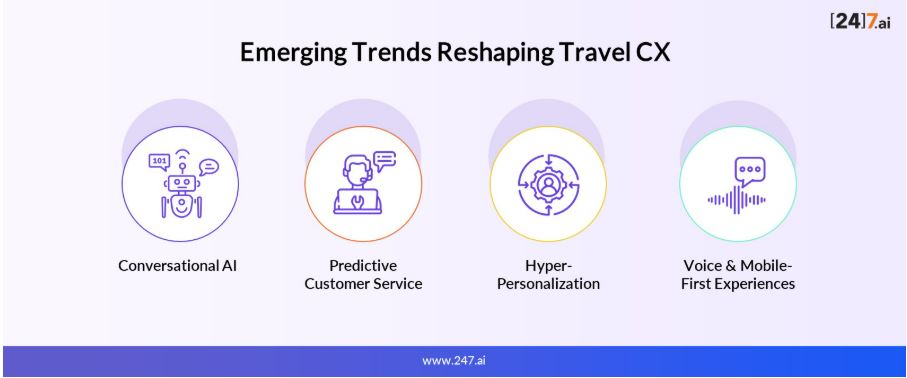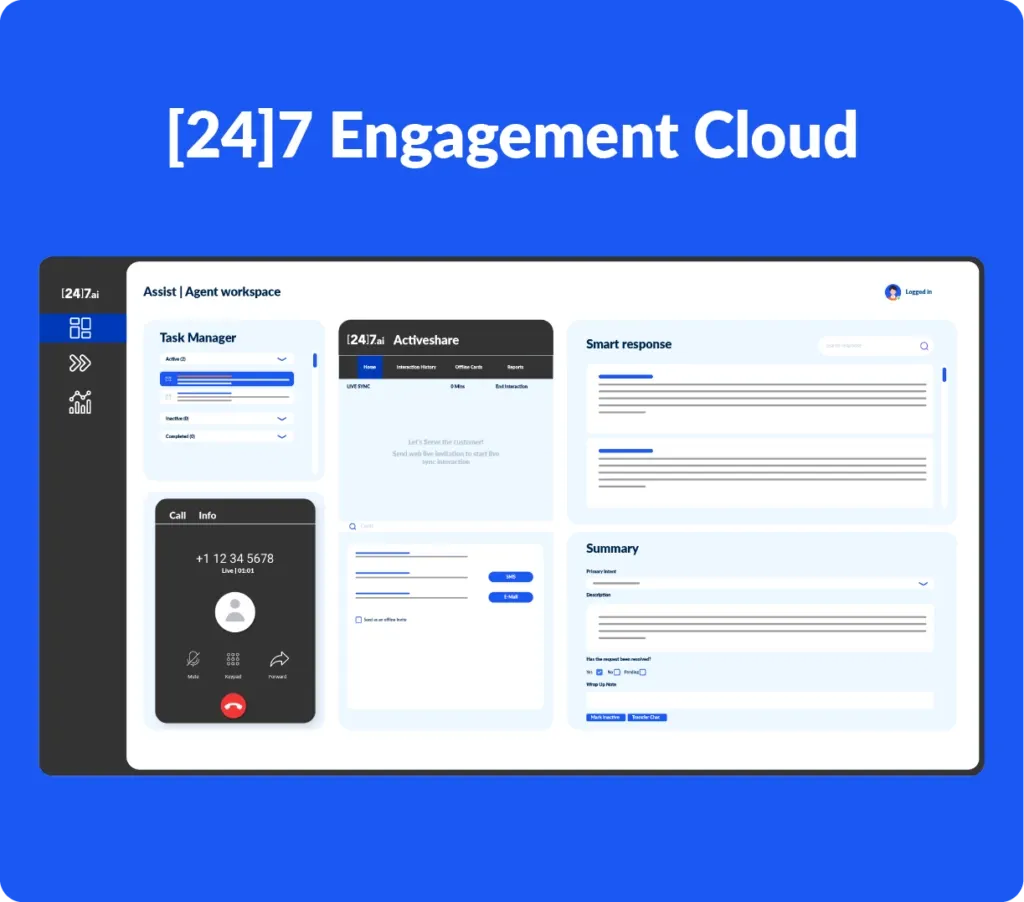For travelers in 2025, fast is the new normal. In the U.S., 44% of leisure travelers and 56% of business travelers book trips at the last minute, with 34% making bookings just 0–3 days before departure. Add to that the millions of mobile-based bookings made daily, and the picture is clear: travelers are making faster decisions, expecting immediate confirmations, and demanding flexibility at every step.
The problem arises with traditional hospitality systems that often move at a fraction of this speed. Long wait times, manual updates, and fragmented experiences frustrate guests who expect instant service. This disconnect is why AI and automation are quickly becoming the backbone of modern hospitality, helping brands deliver real-time, context-aware interactions that match the speed of the modern-day traveler.

The Modern Traveler Profile: Always Moving, Always Connected
- Digital-First Expectations
Modern travelers expect instant booking confirmations, real-time notifications, and seamless access across channels, regardless of them starting on a mobile app, switching to desktop, or engaging via a call center. An interrupted experience feels outdated and unacceptable.
- The ‘Now Economy’ Mindset
Patience has vanished from the modern travel journey. Travelers won’t wait on hold or tolerate slow responses. Instead, they expect proactive service and personalized recommendations the moment they need them. A hotel that suggests airport transfers before arrival or an airline that automatically rebooks a canceled flight stands out in this ecosystem.
- Post-Pandemic Acceleration
The pandemic permanently rewired customer behavior. Contactless check-ins, mobile keys, and digital concierge services which were once optional, are now mandatory. Safety, transparency, and convenience define loyalty, and digital-first interactions remain the default across the industry.
Current CX Pain Points in Travel & Hospitality
Despite progress, significant challenges persist. Long wait times for customer service remain one of the biggest frustrations. When a flight gets canceled or a hotel booking needs modification, the average traveler spends over 30 minutes resolving the issue, which can feel like an eternity for someone on the move.
Fragmentation makes this worse. Too often, a guest shares the same information repeatedly across booking sites, hotel staff, and call centers. Disconnected systems not only slow service but also affect trust. On top of this, most interactions remain reactive rather than proactive. Instead of anticipating needs, such as rebooking ahead of a weather disruption, brands still wait for travelers to complain before acting.

Emerging Trends Reshaping Travel CX
Hospitality leaders are turning to AI and automation to solve these challenges. Four key trends stand out:
- Conversational AI and Intelligent Chatbots
Equipped with natural language processing (NLP), these digital assistants handle complex queries (rebooking flights, suggesting upgrades) instantly and at scale. Unlike static FAQs, they integrate directly with booking systems, ensuring accurate and real-time support.
- Predictive Customer Service
AI models analyze travel patterns, external data (Eg. weather), and customer behavior to predict disruptions before they occur. Imagine receiving a message that your connecting flight has been rebooked before you even land. This shift from reactive to proactive service not only improves satisfaction but also prevents revenue leakage.
- Hyper-Personalization at Scale
Travelers expect personalized itineraries, offers, and pricing. AI makes this possible by analyzing preferences and past behavior. A frequent spa visitor is offered a wellness package, while a business traveler is nudged toward high-speed Wi-Fi upgrades. Personalized engagement has now become a revenue driver.
- Voice-Activated and Mobile-First Experiences
With the rise of voice assistants, travelers can now manage bookings hands-free. Meanwhile, mobile-first experiences powered by IoT, such as smart hotel rooms or airport beacons, enhance convenience. Augmented reality is also emerging, helping guests navigate large resorts or explore local attractions in real time.
The Business Impact: Why Speed Matters More Than Ever
Speed has measurable business outcomes. Studies show that 75% of travelers say that fast resolution of issues is critical to their satisfaction. Conversely, poor service speed leads to direct revenue loss and higher churn.
Slow, manual processes increase operational costs, while AI-powered automation reduces strain on human agents. Brands that deploy fast, seamless CX solutions not only retain more customers but also win market share from slower competitors. In an industry where switching costs are low, speed is the ultimate differentiator.

Solutions in Action: AI-Powered CX Transformation
AI-powered solutions are already reshaping hospitality operations:
- Intelligent virtual assistants manage surges during peak seasons, answering thousands of queries simultaneously. For example, when a snowstorm disrupts flights, a virtual agent can rebook customers instantly while escalating only complex cases to human staff.
- Automated workflow management routes inquiries intelligently, processes refunds or changes instantly, and uses sentiment analysis to prioritize urgent cases.
- Omnichannel orchestration ensures continuity. A guest who starts a conversation on a website can pick it up seamlessly via mobile app or with a contact center agent without repeating information. Unified customer profiles make this possible.
Future Outlook: What’s Next for Travel CX
The next decade will bring smarter AI, deeper IoT integration, and blockchain-enabled secure transactions. Gen Z will drive demand for sustainable, ethical, and hyper-personalized travel experiences. Social media will continue shaping brand reputation in real time.
Over the next few years, hospitality interactions are expected to become increasingly AI-augmented, allowing human staff to focus on meaningful, high-value service moments that technology cannot replicate.
Final Thoughts
Travelers are moving faster, expecting more, and switching brands without hesitation. The cost of inaction is high: lost revenue, declining loyalty, and eroded brand value. By embracing AI-powered CX, travel and hospitality brands can not only keep pace but also lead.
At [24]7.ai, we specialize in helping hospitality leaders transform every interaction into a seamless, revenue-driving experience. From conversational AI to predictive analytics, our solutions accelerate CX transformation at the speed today’s travelers demand.
Ready to reimagine your hospitality CX?
Connect with us today!
FAQs
How does AI make travel CX faster?
By automating routine tasks, predicting disruptions, and delivering instant responses, AI significantly reduces wait times and improves service speed.
Can smaller hotels and travel businesses benefit from AI?
Yes. Even boutique hotels can deploy AI chatbots and automation tools to streamline operations and deliver personalized guest experiences without heavy infrastructure.
What’s the biggest CX challenge for travel brands today?
Fragmented systems that don’t share data across touchpoints, leading to repetitive and frustrating customer experiences.
Will AI replace human hospitality staff?
No. AI handles repetitive and high-volume tasks, freeing human agents to focus on complex, emotional, and high-value interactions.
What’s the ROI of investing in AI-powered CX?
AI reduces operational costs, increases upsell conversion rates, improves retention, and directly impacts revenue through faster, more personalized service.







